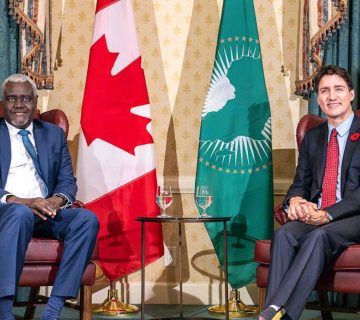Heads of state and governments in the greater Horn of Africa knew that it was only a matter of time before COVID-19 descends on their territories, threatening citizens with loss of lives and livelihoods, and economies with stagnation. The eventual arrival of the ‘global pandemic’ in the region has presented them with the million-dollar question – should they save jobs or save lives? There are no easy or quick answers because the management and containment of COVID-19 are not simple black-and-white issues. The COVID-19 curve is not a standardized one, so the leaders must work with experts to understand the curve in their countries, and tailor-make responses to flatten it without stalling their economies.
A Catch-22 Situation
The region’s leaders have exhibited a mix of proactive and reactive responses to the ‘global pandemic’ ranging from immediate and delayed isolation at designated facilities, and provision of free hand sanitizers in all public spaces, to banning of public transport, suspension of international flights, closure of land borders, and curfews. Prioritizing software of states (the lives of their citizens) over safeguarding a key hardware (the economy) can lead to one of two ends. The first is a healthy but temporarily broke population. The other is an economy that is stagnated by reduced economic activity and temporary freezing of revenue sources, and deviation of resources to the health sector. Healthy, broke citizens can return to gainful employment faster than ill ones, spurring economic activity, and helping to rebound the economy. This is the lesson that leaders such as Uganda’s President Yoweri Museveni, and Rwanda’s President Paul Kagame have learnt from China, Italy, Spain, and Taiwan. Museveni instituted mandatory quarantine for all airport arrivals, while Kagame’s administration provided free hand sanitizers for use in public spaces way before any case was reported in their respective countries.
On the flip side, prioritizing the economy over the health of citizens produces moneyed but ill or dead citizens and grievances. Sick workers are economically unproductive. In economies such as those in the region where several individuals depend on one breadwinner, and where most of these breadwinners are in a hand-to-mouth existence, the needs of households that depend on the now-sick breadwinners will be unmet. The cost of treating the ill will cripple many such households further. If these breadwinners die, there will be hordes of aggrieved gainfully unemployed individuals. Added to the problems of active conflicts, and large numbers of unemployed youth in the region, this is a recipe for increased criminal activity that states in the region cannot afford.
Horn of Africa’s continued struggle with the three interrelated enemies of development – disease, hunger, and illiteracy – complicates efforts to contain the virus further. In the face of COVID-10, thousands of citizens, probably ill-informed about the potential of the disease to kill them, are concerned more about what they will eat than if they will be alive tomorrow to eat. Some of them think they are invincible, while others think they will die of hunger before this virus kills them. All of them expect their governments to keep them safe.
Most of the region’s leaders are implementing two-pronged approaches to balance the ‘health-economics’ equation. Kenya’s President Uhuru Kenyatta, for example, has opted for measures for slowed rather than negative economic growth, and minimized community spread. COVID-19 will slow Kenya’s economic growth to about three per cent, Central Bank of Kenya says. Kenyatta’s administration has instituted pay cuts for the executive, lowered taxes paid by individuals (Pay As You Earn) by five per cent, and on goods (value added tax) by two per cent. It has also allowed the movement of cargo planes but suspended international passenger flights to ensure availability of goods while preventing further cross-border spread. A raft of measures including curfews, self-distancing, for example, are also in place to ensure citizens are taking responsibility for safeguarding their health, while supporting government efforts to minimize the spread and impact of COVID-19.
Making Smart Choices
COVID-19 has made the potential of underfunded and/or under supported sectors of the economy apparent. These include research in peace and security, biological threats, community resilience, for example, and digitally-driven enterprises (e-learning, online marketing). Post-COVID-19 leaders in the Horn of Africa region should invest in such sectors. This will diversify economies further, reducing overreliance on the tourism and agricultural sectors. It will also help to increase knowledge and expertise, reducing the kind of reliance on foreign nations and institutions that has slowed the region’s response to COVID-19. They should also strengthen the research, human resource, and funding capacities of the East African Community, African Union, Intergovernmental Authority on Development to help with the quick implementation of joint, coordinated responses to biological and other kinds of threats that compromise regional peace and stability.
Voters’ agenda in Burundi, Ethiopia, and Somalia where general polls are expected in May, August, and December 2020 respectively will feature COVID-19. No case has been reported in Burundi yet, and the number may not be high enough to stall the upcoming election. However, if the number of cases increase in the next week or two, Burundi’s poll may be postponed, challenging the constitutionally determined presidential term limit. The likelihood of poll-related unrest there remains. Elections are likely to go on as scheduled in Ethiopia and Somalia, but only time will tell.
In the meantime, leaders should enforce World Health Organization guidelines to limit the spread of the virus because the healthcare infrastructure in most states in the region cannot accommodate high numbers of critically ill citizens at once, and millions of cash-strapped citizens cannot be kept away from their income-generating activities for extended periods. Compliance should be forceful if this becomes necessary. Individuals who disrespect mandatory quarantine procedures – both the potentially exposed citizens, and those in charge of facilities that have been designated as isolation centers – should be called out.
Roselyne Omondi is the Associate Director, Research, at the HORN Institute
Photo: Details of COVID-19 test tubes (Photo Credit: Camarillo Acorn)



